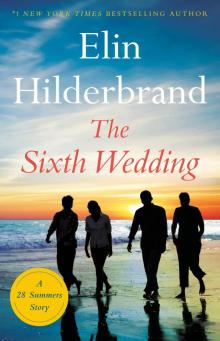- Home
- Elin Hilderbrand
What Happens in Paradise Page 9
What Happens in Paradise Read online
Page 9
“I’ll come back for my things another time,” Irene says. “On a Saturday. Or after hours.”
Mavis says, “Whatever you need, Irene. Please ask me.” She opens her arms and Irene allows herself to be hugged. “I hope you figure this out.”
“Me too,” Irene says.
Back at home, Irene sits at the kitchen table with her list in front of her. Death certificates—being pursued. Resignation—tendered.
Obituary. Irene flips to the next page of her notebook and writes, Russell Steele died Tuesday, January 1. He is survived by his wife of thirty-five years, Irene Hagen Steele, and his sons, Baker and Cashman Steele.
Is that all? Irene can’t mention his job at Ascension. She could maybe say that he worked for the Corn Refiners Association for two decades. She could mention Rotary Club and his years of service to the Iowa City school board.
She drops her pen, picks up her phone. She sends a text to her best friend, Dr. Lydia Christensen.
Lydia, the first text says.
Irene feels like she’s falling backward in one of those Outward Bound games where you’re supposed to trust your comrades to catch you.
Russ is dead. He died on New Year’s Day but I didn’t find out until I got home from our dinner. The circumstances were so extraordinary and, honestly, so baffling that I didn’t know how to tell you or anyone else. I’ll call you later, I promise.
Irene presses Send.
Okay, she thinks. It’s officially out in the world. Unlike Mavis, Lydia is not a vault.
A little while later, the doorbell rings. The doorbell is an antique, salvaged from a convent in Vicenza, Italy, and it makes quite a formal sound, somewhere between a gong and cathedral bells. Irene hurries down the hallway, hoping and praying it’s FedEx with the death certificates but knowing that, unless Paulette read Irene’s mind before she left the voicemail, that’s logistically impossible. It might be Lydia, though Lydia normally flings open the door and walks right in. Maybe Lydia called the Dunns and the Kinseys and this is the start of the onslaught. Bobbi Kinsey will have pulled a casserole from her freezer or stopped by the Hy-Vee for a deli tray.
Irene pauses before opening the door and takes a sustaining breath. She’ll tell people the truth—helicopter crash, Virgin Islands, work, but leave out the villa, the mistress, and Maia.
Strong, beautiful Maia.
Irene opens the door. It’s not Lydia, and it’s not Bobbi. It’s four men in dark suits, trench coats, and impractical shoes for the weather. The man in front—African-American, tall and broad, with a grim facial expression—flashes a badge.
“Irene Steele?” he says.
Irene is so stunned, she can’t speak. Is she being arrested?
“Are you Irene Steele?” the man says. “Is this the Steele residence?” He glances above the door frame, then down toward the corner of Linn. “Thirty Church Street?”
Irene nods. “Yes, it is. I am.”
“Agent Kenneth Beckett, FBI, white-collar crime division. We have a search warrant for this address. If you’ll kindly step aside.”
White-collar crime. Irene steps aside.
Three of the agents start searching the house. Irene’s instinct is to follow them—not to hide anything but to make sure they’re careful with her things. However, Agent Beckett wants to talk to Irene in private. She leads him to the amethyst parlor. It’s chilly and she offers to lay a fire.
“Just please sit down, Mrs. Steele,” Agent Beckett says. He’s stern and serious, like an FBI agent on television. Irene notices a black and gold knit cap sticking out of his briefcase.
“Iowa grad?” she asks. “I’m the class of ’84.”
“Class of ’91,” Beckett says. For a second, his eyes smile. “Go Hawks.”
“They aren’t going to break anything, are they?” Irene asks. “This house…well, it took me six years to renovate and the antiques are real. There’s a mural in the dining room; the moldings and trim have all been restored to period. The carpets…” She stares down at Beckett’s wet and icy wingtips on the Queen Victoria jewel-box carpet. “They’ll be careful, right? Respectful?”
Quick nod. “We’re professionals.”
“Of course.”
“Your husband was Russell Steele?” Beckett says. “Died January first in a helicopter crash off the coast of Virgin Gorda?”
“Yes.”
“And what did your husband do for a living, Mrs. Steele?”
Irene briefly wonders if she needs a lawyer present. She tries to imagine Ed Sorley in his sweater-vest dealing with these gentlemen. The idea is nearly laughable.
The fact is, Irene has done nothing wrong. Irene has nothing to hide.
“He worked for a hedge fund called Ascension,” Irene says.
“What was his position there?”
“My understanding was that he was in customer relations.”
Beckett looks up. “Customer relations.”
“Not like he answered the phone and took complaints,” Irene says. “He wined and dined the clients, played golf, a lot of golf, made them comfortable. Russ was a very…nice guy. Nonthreatening, friendly, engaging. He told a lot of corny jokes, asked to see pictures of your kids, remembered their names.” Irene had been jealous, at times, of how good with people Russ was, how generous with his attention. All of their friends and acquaintances liked Russ better than her. And that was fine, Irene understood; they had their roles. Irene let Russ do the talking because he liked it and she didn’t. She enjoyed quieter things—reading novels, cooking, nurturing one-on-one friendships, achieving goals in a timely and organized fashion, whether it was renovating a room in this house or putting an issue of the magazine to bed. She enjoyed fishing, the peace of being out on the water with a single simple mission.
Why is she thinking about fishing?
Well, she knows why.
“And where is this company, Ascension, based?” Beckett asks.
“Miami?” Irene says. “I’m not sure, though. Russ did a lot of traveling for work. He told me he was in Florida, Texas…”
“Told you?” Beckett says.
“Yes,” Irene says. “But I now have reason to believe he spent most of his time in the Virgin Islands. In St. John.”
Beckett scratches down a note.
“You know my husband owns property in St. John.”
“Yes,” Beckett says. “Federal agents are searching that house now.”
“Oh, dear,” Irene says.
Beckett looks up. “What?”
“I put my son Cash on a plane to St. Thomas this morning,” Irene says. “He’ll arrive at the house in St. John sometime tonight.”
Beckett nods. “They should be finished with the search by then.”
“But if they’re not?”
“They’ll let him know and he can make other arrangements.”
Huck, Irene thinks. Maybe he can stay with Huck for a night or two. Which is a crazy thought. Huck isn’t family; he’s merely a sort of friend.
“I guess I’m confused about what you’re after. Is this part of the investigation about the helicopter?”
“Possibly related,” Beckett says. “Do you know a man named Todd Croft?”
“Russ’s boss,” Irene says. “I met him once, December 2005, in the lobby of the Drake Hotel in Chicago. That was right before he offered Russ the job at Ascension. They knew each other at Northwestern. Or at least, that’s what Russ said.”
“Do you have contact information for Mr. Croft?” Beckett asks.
“I don’t. Mr. Croft’s secretary, Marilyn Monroe, called here on the night of January first to tell me Russ had died. I’ve tried calling her back since then but that number has been disconnected and the Ascension website is down.”
Beckett says, “Your husband made quite a good living, isn’t that right?”
“Yes,” Irene says. “After he took the job with Ascension.”
“This house must have been expensive to renovate.”
�
��It was.”
“And how did you think your husband was earning so much money?”
“He worked at a hedge fund,” Irene says. “And I thought that provided a good salary. I didn’t know about St. John. I didn’t know about the other house…”
“You went down there recently, though? After he died?”
“Yes. That was my first time. We went for a week and returned home last Friday. My mother-in-law, Russ’s mother, was failing. Now she’s passed away so I have that to deal with.”
“I’m sorry,” Beckett says. He looks at her again, this time more sympathetically.
“Would you like some tea, Agent Beckett?”
“No, but thank you.”
“I’d like some tea,” Irene says. “Is it all right if we go into the kitchen so I can make some? I mean, I’m free to move around the house, right?”
“Just stay where we can see you,” Agent Beckett says. He rests his hands on his thighs and pushes himself to a stand. “Actually, some tea might warm me up.”
Irene makes a pot of Lady Grey, and while she’s at it, she prepares a tray of sandwiches and rinses two bunches of grapes. Agent Beckett accepts a ham and cheese and a cup of tea. An agent who looks like Tom Selleck pops into the kitchen to report that they have found nothing.
“Did you remove or destroy any of your husband’s papers or personal belongings after he died?” Beckett asks.
“I did not,” Irene says. “I searched through both this house and the house on St. John, looking for clues.”
“Clues?”
“What he was into,” Irene says. “Certainly, Agent Beckett, you realize that I think all this is suspicious as well. My husband was killed in a place I didn’t know he was visiting, then I found out he lived there. He owned property there. I was looking for answers.”
“What did you find?”
A mistress, Irene thinks. A love child. “Nothing,” she says.
The youngest agent—a baby-faced ginger—pokes his head into the kitchen. “Nothing in the master bed or bath,” he says. He eyes the tray of sandwiches. “Are those for everyone?”
“Help yourself,” Irene says. Then she thinks of something! A hiding place! She looks at Beckett, who is reviewing his notes as he eats his ham and cheese.
No, she won’t tell them. Maybe they’ll find it. Maybe they won’t.
Irene wonders if this investigation can work both ways. “I called my real estate contact in St. John to request a death certificate.” She blows across the surface of her tea. “My family attorney here says that until I produce it, Russ is technically still alive.” She pauses, waiting for a reaction, but none comes. “Which would be quite something, because we’ve already scattered the ashes. Or what we thought were Russ’s ashes. I never saw the body and I wasn’t consulted about the cremation until after it was a done deal. Is there any chance…I mean, do you think my husband might still be alive?”
Beckett stands up to secure the door to the hallway and then the door to the dining room. “You’ve been very accommodating,” he says. “And we appreciate it. I’m sure you realize that we’re here because we have reason to believe your husband had illegal business dealings. The one thing I can assure you”—Agent Beckett holds Irene’s gaze—“is that your husband is dead.”
“He is,” Irene says. Yes, he is, she knows this. She has been processing this news for over two weeks. And yet hearing Beckett say the words comes as a fresh shock. Irene’s eyes sting with tears. The dreams were just that—dreams—but Irene must have been hanging on to a thread of hope. None of this added up. From the beginning, it felt like a hoax. The person who told Irene that Russ was dead—Marilyn Monroe—wasn’t someone Irene had ever met face to face. Paulette had been professional to the point of seeming insensitive, nearly as if she was just going through the motions because she knew Russ would turn up eventually. “You’re sure?”
“Yes,” Beckett says. He must have definitive proof, Irene thinks, but he isn’t sharing it. “We’re going to need your cell phone and your computer. They’ll both be returned to you.”
“Yes, of course,” Irene says. She pulls her cell phone out of her purse just as it lights up and starts chiming with a call from Lydia. Of course it’s Lydia. Irene hits Decline and hands it over. She nods at her laptop on the desk in the corner. “When you say my husband had illegal business dealings, you mean Ascension had illegal business dealings, right? Todd Croft had illegal business dealings. I can tell you right now that Russ just wasn’t the kind of person who would—” She notices the expression on Agent Beckett’s face and stops talking. Russ wasn’t the kind of person who would…what? Have a mistress, a secret daughter, and a nine-bedroom villa down in the Caribbean? It’s pretty clear that Irene doesn’t know what kind of person Russ was. She is as clueless as Ruth Madoff was. Irene remembers back when that news story broke. She had thought, Of course the wife knew her husband was running a bazillion-dollar Ponzi scheme. How could she not know? But now that Irene is in a similar situation, she’s certain Mrs. Madoff had no idea what was going on. She probably spent all her time at the club lunching with her friends and meeting with her personal shopper. And if Ruth Madoff—or Irene—had asked her husband questions about his business, who’s to say either woman would have been told the truth?
Irene, for one, hadn’t asked any questions. She had happily accepted the money Russ deposited into her renovation account and turned her attention to wallpaper and crown molding. “Are you looking for Todd Croft?”
Barely a nod from Beckett. “Not at liberty to say.”
Yes; the answer was yes. “He’s drinking a daiquiri on some remote island without a name,” Irene says.
“That actually happens less than one would imagine,” Beckett says. “Men like Todd Croft can’t just drop out of society. They’re too power hungry.” Beckett pops the last bite of sandwich into his mouth and polishes off his tea. “Don’t worry. He’ll turn up.”
“I did learn two things on my own,” Irene says, “that you might find helpful.” She’s hesitant to hand over what she knows, but Russ’s words have taken root inside of her. Irene is the only person I trust to do the right thing. He probably meant the right thing for Rosie and Maia but he most certainly also meant the right thing morally, which was to cooperate with the FBI, tell the truth, preserve her own integrity, protect the boys. “We have a bank account at Federal Republic. I have a statement I can give you. And the teller informed me that Russ made the last two deposits of seventy-five hundred dollars apiece…in cash.” Irene searches Agent Beckett’s face to see if this news startles him as much as it startled her, but he doesn’t even blink. Of course, he’s in the FBI. He has seen…Irene can’t even imagine what. “And I asked my attorney, Ed, Edward Sorley, to find the account that Russ used to pay for this house when we bought it. He has a copy of a cashier’s check drawn on a bank—MGST or something like that—in the Cayman Islands.”
Agent Beckett’s left eyebrow lifts a fraction of an inch. “Sounds about right,” he says. “Would you give me Mr. Sorley’s contact information, please?”
The FBI agents leave at eight thirty that night. As they’re finally heading out the door—with far less evidence than they anticipated, Irene can tell by their dejected demeanors—she suggests that they go to the Wig and Pen for dinner.
“Great wings,” she says. “My mother-in-law…” But she can’t finish the sentence.
Agent Beckett shakes her hand. “Thank you for your help today.”
Irene finds herself uncharacteristically craving validation. She was helpful, right? They’re aware from how cooperative and accommodating she’s been, from the details she’s shared, and from her general demeanor that she had no idea what Russ was involved with. She is innocent. She should not be held accountable—and yet she fears that she’ll see these men again storming her house in the predawn hours with a warrant for her arrest.
Their visit today has taken its toll; she’s scared.
“Will
you be back tomorrow?” she asks.
“Someone will be by to drop off your phone and your computer,” he says. “Here’s my card. Don’t hesitate to call if you think of anything else you want to tell us.”
Irene waits ten minutes, then fifteen. When she’s positive the agents are not coming back, she snaps off the porch light and heads for the library.
The house phone rings, startling her.
Should she answer?
It’s probably Cash, wondering why she isn’t answering her cell phone. Well, honey, the FBI has it…
“Irene?”
“Lydia,” Irene says. She carries the phone into the library, where she snaps on the Tiffany lamp and collapses in her favorite reading chair. “Hi.”
“I got your texts,” Lydia says. “But then you didn’t answer when I called. You can’t…be serious? Russ is not dead! You would have told me right away if you’d found out he was dead. It was just hyperbole, right? You wish he were dead. What did he do wrong? He was away somewhere, right?”
“The Virgin Islands,” Irene says. The conversation feels like a hill she doesn’t want to climb.
“The…where? Did you tell me Russ was in the Virgin Islands? You didn’t tell me that. I would have remembered.”
Irene closes her eyes. This is just as excruciating as she feared it would be. She has made things far worse by waiting for so long. Lydia doesn’t believe her; Irene should have called her right away. Irene should have brought her—or someone—in at the beginning. But she hadn’t. It had been so sudden and so bizarre, so inexplicable. It was still inexplicable—and yet, here they are.
“Lydia,” Irene says. “Russ is dead. He was killed in a helicopter crash in the Virgin Islands on January first. He was there on business. The rest of the details are too painful to share right now. His body was cremated and the boys and I flew down to scatter his ashes.”
“What?” Lydia shouts. There’s a muffled voice in the background. “Brandon and I are on our way over right now.”
“No,” Irene says. “Please, I was just heading up to bed. We’ll talk tomorrow, I promise.” She thinks for a second. “Brandon who?”

 What Happens in Paradise
What Happens in Paradise Reunion Beach
Reunion Beach The Sixth Wedding
The Sixth Wedding 28 Summers
28 Summers Summer of '79: A Summer of '69 Story
Summer of '79: A Summer of '69 Story Troubles in Paradise
Troubles in Paradise The Perfect Couple
The Perfect Couple Winter Solstice
Winter Solstice Barefoot: A Novel
Barefoot: A Novel